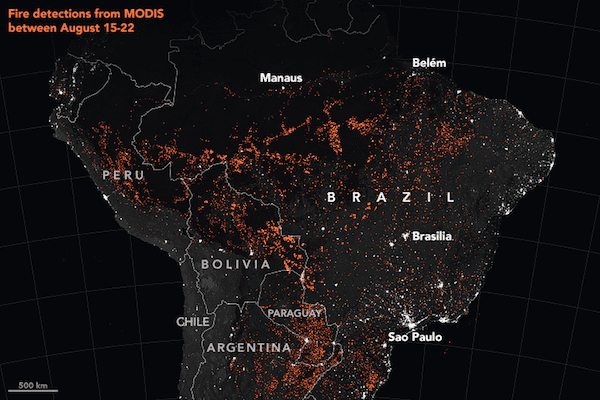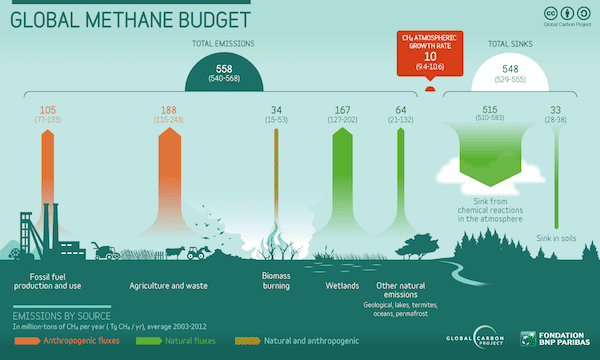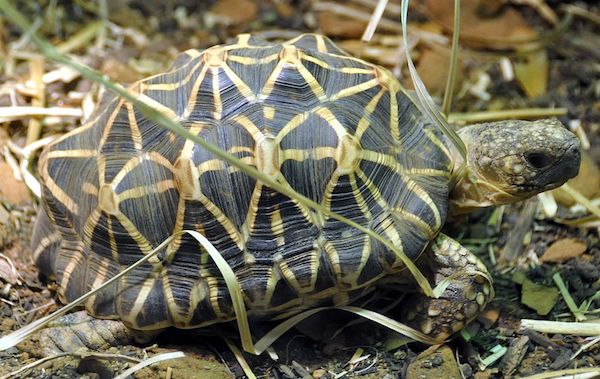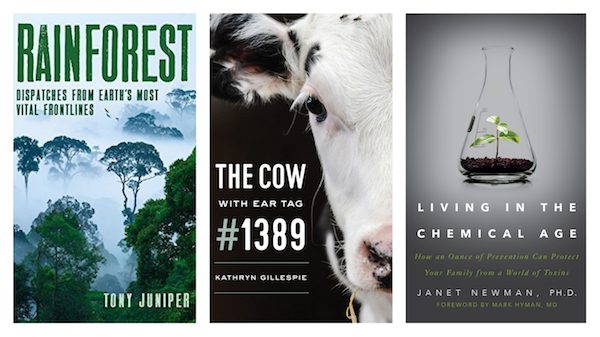
Marjorie Cohn, a professor emerita at Thomas Jefferson School of Law and former deputy secretary-general of the International Association of Democratic Lawyers, argues that it’s time for the United Nations to step in. “As empowered by the United Nations Charter, the Security Council should find that the fires in the Amazon pose a ‘threat to the peace’ and order measures to restore and maintain international peace and security. Those measures ‘may include complete or partial interruption of economic relations,’” she writes. “The Council should require that member states refrain from entering into trade agreements with Brazil unless and until it agrees to allow international economic and physical firefighting assistance.”


Change: The Amazon continues to burn. Dramatic and swift action needs to take place, and one political body that has the power to take this action is the United Nations. Due to the powers vested in its Charter, the U.N. can “take action on the issues confronting humanity in the 21st century, such as peace and security, climate change, sustainable development, human rights, disarmament, terrorism, humanitarian and health emergencies, gender equality, governance, food production, and more.” The Amazon wildfire crisis checks many of these boxes. Specifically, the U.N. could: 1) send in immediate humanitarian support to all the Indigenous and local groups who have lost their homes and way of life, 2) coordinate a large-scale effort with Brazil and neighboring countries to fight the fires in the most high risk areas, such as those threatening Indigenous communities, wildlife habitats and the most fragile ecosystems, and 3) create economic sanctions on unsustainable logging and cattle ranching in Brazil.
>>>Urge the United Nations to use its authority to save the Amazon rainforest.
Wolf Conservation Center: Wolves once ranged across most of North America, a vital part of many varied ecosystems. But by 1950, an unremitting slaughter by humans brought wolves to the brink of extinction. After its passage in 1973, the Endangered Species Act (ESA) provided protection for wolves, allowing them to begin the process of recovery. The ESA has worked successfully for over four-and-a-half decades to prevent the extinction of 99 percent of the species placed under its protection. Moreover, the ESA is popular: A recent national poll found that the law is supported by 90 percent of American voters. But despite its success and public support, the ESA is under political attack.
>>>Urge your Congressional representatives to protect the Endangered Species Act.
Nonhuman Rights Project: Beulah, Karen and Minnie are three wild-born elephants who have been held captive and exploited for over three decades by the Commerford Zoo, a traveling circus cited by the U.S. Department of Agriculture more than 50 times for violating minimum standards of the Animal Welfare Act. Beulah, Karen and Minnie are forced to perform at circuses and fairs where they are required to give rides despite Beulah’s painful foot disorder and Minnie’s aggression from years of psychological abuse that has resulted in her attacking handers and the public. Clearly, the Commerford Zoo values profits over the elephants’ well-being or human safety. These highly intelligent, autonomous, self-aware beings deserve the opportunity to live the life that was stolen from them so long ago. Beulah, Karen and Minnie should be immediately transferred to the Performing Animal Welfare Society (PAWS), a preeminent elephant sanctuary in the United States that has agreed to provide the elephants with refuge and lifelong care at no cost to the Commerford Zoo.
>>>Urge the Commerford Zoo to release Beulah, Karen and Minnie to PAWS.
Cause for concern…

- Trump administration planning to roll back limits on oil and gas companies’ emissions of methane (Merrit Kennedy, NPR)
- Climate scientists say climate change will lead to more powerful storms—Hurricane Dorian proves they’re right (Steve Hanley, Clean Technica)
- One-quarter of the world’s tropical land could disappear by the end of the century unless meat and dairy consumption falls (University of Edinburgh)
- Flying first class on a single domestic round trip can contribute more greenhouse gas emissions than a year of driving (Michael Sivak, Green Car Congress)
- We ignore thousands of threatened plant species at our own peril (Lorraine Chow, Truthout)
- Only a few individuals of a plant species may be prepared for increasing droughts (Max-Planck-Gesellschaft)
- Food waste is likely driven in part by ambiguous date labels on packages (Ohio State University)
Round of applause…

- More than 130 species won protections for the first time at CITES, the Convention on International Trade in Endangered Species of Fauna and Flora (Dina Fine Maron and Rachel Fobar, National Geographic)
- Philippine bill seeks to grant nature the same legal rights as humans (Leilani Chavez, Mongabay)
- Current investigation of ExxonMobil could spur broader climate action (Patti Lynn, Truthout)
- Time for an EU commissioner for animal welfare (Michel Vandenbosch, EUobserver)
- Air pollution cuts are saving lives in New York state (Marie Denoia Aronsohn, Earth Institute at Columbia University)
- British Airways is the latest to cut all ties with SeaWorld (Jemima Webber, LIVEKINDLY)
What we’re reading…

Under fire: In his new book “Rainforest: Dispatches from Earth’s Most Vital Frontlines” (Island Press, 2019), preeminent conservationist Tony Juniper provides a comprehensive look at the critical role that rainforests play in the planet’s complex ecological web—and why the survival of all species, including us, is tied to theirs. “[R]ainforests are among the most important of the Earth’s carbon stores and their preservation and restoration is one of the least expensive actions that we can take to reduce carbon dioxide emissions, remove carbon from the atmosphere, and in the process help avoid the worst effects of climate change,” writes Juniper, chair of Natural England, the United Kingdom’s official government conservation agency. He also offers the cautionary of Indonesia, which “largely erased its rainforests over two decades, aided by the World Bank and the IMF—and multinationals.”
Milk’s true cost: In “The Cow with Ear Tag #1389” (University of Chicago Press, 2018), animal studies scholar Kathryn Gillespie offers an incisive examination of the dairy industry—from the disturbing animal welfare issues that underscore the commodification of animals, to the destructive impact that mankind’s taste for milk, cheese and ice cream is having on the environment—demonstrated by her titular cow. She writes that, in doing research for this book, “The grocery store became a site for mourning: the innocuous refrigerators filled with milk, yogurt, cheese, butter, and eggs; the freezers of ice cream; the cases of meat, neatly packaged and priced—these suddenly became, to me, the products of immeasurable violence.”
Healthier living: “On any given day, we are exposed to toxic chemicals that can enter our bodies through the food we eat, the water we drink, the air we breathe, and the products we encounter via our skin,” writes Janet Newman in her book “Living in the Chemical Age” (Lioncrest, 2018). “Most of these chemicals are man-made and didn’t exist before the Industrial Age, so our bodies haven’t had an evolutionary chance to adapt,” she notes, offering several strategies to keep us safe, from reducing exposure to toxic chemicals in our kitchens, to houseplants that can help detoxify indoor air.
Parting thought…
“We cannot treat this in isolation. We cannot solve climate change without biodiversity.” —Cristiana Paşca Palmer, Executive Secretary of the U.N. Convention on Biological Diversity